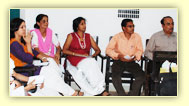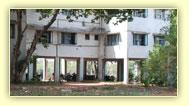With an emphasis on empirical research and Gujarat as its core research region, Centre also undertakes studies related to other parts of the country. Without compromising its core ethical commitment for the marginal and deprived sections of society and theoretically informed and empirically rigorous social science research, the thrust areas of CSS research has shifted over the decades.
The research interests of the faculty encompass a wide area including scientific methods of enquiry, studies on tribal communities, dalits and minority groups, ethnographic enquiries, sects and religion, rural transformation, social conflicts, movements and riots, urbanization and development, urban and regional planning, literature and social consciousness, human resource development (education and health), coastal studies, environmental issues and social impact assessment of projects.
The focus of Centre’s research since inception is not only to contribute to theoretical knowledge but also to assist in policy formulations for issues pertaining to social development. Having a wide ranging canvas, the research projects in the centre have addressed issues related to policies, programmes, planning and understanding of the past and the present socio-economic context and political dimensions of the State, region and the country.
Responding to contemporary dynamics of development, key areas of research, include marginal communities, migration, labour, land and credit markets, society and Violence, culture and conflict, public health, environment and resources, governance, women and society, social justice and civil society. Theoretical contributions of CSS have been well-recognised in the field of social stratification, agrarian relations, social movements, sociology of education, dalits, tribes and development studies. Persistent empirical enquiries into deprivation, under-development and marginalization among the scheduled castes, tribes (including nomadic tribes), women and minorities highlight our research concerns.
Centre has been carrying out a number of projects pertaining to its key areas of research. During the last five decades, CSS has carried out 288 research projects sponsored by regional, national and international agencies. Persistent empirical inquiries into deprivation, underdevelopment and marginalization among the scheduled castes, tribes (including nomadic tribes), women and minorities highlight our research concerns.
In late seventies and early eighties, a few studies related with planning were carried out. The efforts of the institute were recognised by the government and policy makers when in the early eighties, the CSS was assigned the project on monitoring and evaluation of rehabilitation and resettlement of people affected by Sardar Sarovar Project (SSP). The CSS continued to carry this monitoring project of SSP rehabilitation till very recently and has brought out more than 25 reports on various facets of this process. Subsequently, the CSS carried out many evaluation studies commissioned both by government departments and non-government organisations.
In mid-eighties, scholars at the CSS engaged in debates over reservation with regard to making social and/or economic criteria as the basis for reservation. Strengthening and deepening its understanding of tribal society, issues pertaining to labour as well as literature, historians at the Centre also worked on issues like the ‘Devi movement’, labour history as well as on literature and social consciousness in the early nineteenth century.
With Surat being a leading industrial centre in textile and diamonds, CSS has completed several studies on the working class in different enterprises like cottage industries, jari and embroidery, textile, diamond etc. In 1984, in response to a writ petition filed, the Gujarat High Court commissioned the CSS and the South Gujarat University, Surat to carry out a survey on “Working and Living Conditions of Surat Textile Workers”.
Responding to the emerging events and changes, in the decade of nineties, faculty members at CSS studied the communal violence in Surat at the aftermath of the Babri mosque demolition in 1992, the plague and urban planning in 1994, carried out a large-scale research on ethnography of malaria and undertook a large study of slums in Surat city. In the early nineties, CSS took a large project on social justice and covered various segments and aspects associated with prevalence of injustice around. Under the auspices of this enquiry, studies relating to the status of women, dalits and tribals in particular were carried out. A re-study of the earlier research done on practice of untouchability in rural Gujarat was also done. The gender issues have been explored in Centre’s research through studies on women’s participation in development programs, condition of women workers in the formal and informal sectors, their participation in various cooperative societies and panchayat institutions, etc. In addition, the projects have also covered cases of atrocities against dalits and tribals.
To summaries our priority areas of research in the past were:
• a) Development, Displacement and Rehabilitation;
• b) Human Rights, Civil Society and Governance;
• c) Social and Religious Movements: Conflicts, Struggles and Violence;
• d) Social Impact Assessment of Development Programmes;
• e) Social Responsibilities of the Corporate Sector;
• f) Water Resources Management;
• g) Health Care Seeking Behaviour;
• h) Micro Finance and the Poor
Contemporary Concerns
In recent decades, CSS has moved into some more areas covering public health, Panchayati Raj institutions, micro finance, rural credit markets, waste management and the city governance, visual culture, urban society, impact analysis of projects on people of coastal areas, studies of ground water depletion and salinity ingress, marine fishery resource management, impact of land acquisition for industries on the rural population, pastoralism and natural resource use as well as gender issues in water resource management.
Current researches in the centre broadly includes following themes and programmes:
Capital, Labour and the City in the Era of Globalization
This research programme draws its relevance from the current context of liberalisation and its impact on sections of labour engaged in industrial activities, especially in the ‘unorganized’ sector of Surat. This study looks at the inter-relation of four crucial components: capital, labour, migration and the social relationship in the changing milieu of Surat. By examining the complex web of these forces, the research programme proposes to focus at three levels – (a) relationship of production in unorganised production units, (b) migrant workers and unorganised labour market and, c) social and urban milieu of capital and labour in Surat.
Social Change, Identity and Development in Tribal Society
Located in the South Gujarat region that has a large share of tribal population, Centre has been committed to document and understand tribal communities both in historical as well as contemporary terms. Focused on South Gujarat, the objective has been to document and understand various aspects of tribal communities of the region including identity, education, social life, impact of government policies (i.e. PESA, 1996 and The Scheduled Tribes and Other Traditional Forest Dwellers Act, 2006, the forest policy, health practices and health care systems, struggle over forest land and religious practices.
Migration, Labour and Credit Markets
Migration has been a key factor in shaping the social dynamics in significant manner. CSS continues to investigate dynamics of migration in relation to issues like livelihood strategies of migrants, its linkages with urban labour market, financial behavior and questions pertaining to the life of migrants in the city. With the arrival of new financial institutions, public sector banks and many more development schemes credit market particularly the dynamics of microfinance in the field is one of the most relevant field of study. Issues of concern include marginalized groups (particularly dalits and their exodus), question of inequality, dynamics of capital and the relation between credit market with the society.
Health and Human Development/Health Systems Studies/Health Policy and Planning
Health is not just a ‘medical’ issue but is seen as a crucial ‘development’ and ‘human rights’ issue. In the contemporary context, CSS focuses on issues related to health and human development and poverty and intends to work on health system studies. Health Systems Studies Unit (HSSU) will work on further identifying the linkages between health and development in general and will also try to focus on specific linkages between health and poverty, health and education and social inequality and nutrition, etc.
Urban Landscape
Recent decades have witnessed an unprecedented growth of cities. Research endeavors at CSS aims to study non-metropolitan contemporary cities locating them in a socio-cultural and spatial setting. Deploying two different perspectives (as a spatio-temporal site located within a given geo-social context and as a networked locality working in and through the global flow of capital, labour and information), major concerns of the cluster are: spatial dynamics of urban landscape and Lived experiences of city life.
Contemporary Rural Transformation
Designed as a cluster of inter-connected studies under the broad research programme of social rural transformation in the contemporary times, the programme aims to document and analyse the village society at the cusp of fast pace of globalization ushering an enhanced flow of capital and labour to and from the rural society on the one hand and, the social dynamics of contemporary electoral politics getting unfolded on the other. These studies are around contestation, negotiation and resistance over the issues of livelihood, land, caste-class and consumption as three core aspects in contemporary rural India.



